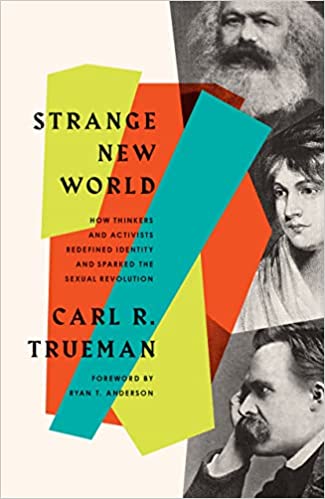
Carl R. Trueman, The Rise and Triumph of the Modern Self: Cultural Amnesia, Expressive Individualism, and the Road to Sexual Revolution.
Here is the Goodreads/publisher’s description:
Since the landmark Obergefell v. Hodges [United States] Supreme Court decision in 2015, sexual identity has dominated both public discourse and cultural trends—and yet, no historical phenomenon is its own cause. From Augustine to Marx, various views and perspectives have contributed to the modern understanding of self. In The Rise and Triumph of the Modern Self, Carl Trueman carefully analyzes the roots and development of the sexual revolution as a symptom, rather than the cause, of the human search for identity. This timely exploration of the history of thought behind the sexual revolution teaches readers about the past, brings clarity to the present, and gives guidance for the future as Christians navigate the culture’s ever-changing search for identity.
>>>>
Here’s the review by Tim Stewart:
Well, this was a very thorough treatment of a very relevant and difficult topic. Honestly, it’s so thorough that it can feel overly thick and tedious. Still, I think a book like this needs to be written, showing in great detail the historical, intellectual, and philosophical foundations of our current cultural milieu.
Perhaps to put it simply, the roots of current views on sexuality and gender are found in the thoughts of Rousseau, Freud, and others of their time— who began to untether human identity from divine revelation, objective reality, or social standing.
Now, feeling trumps physical; psychology overrules biology. What was once the diversity of personality within biological genders is now biological diversity within psychologically defined categories of identity.
As people define themselves based on feelings, the author wonders which social taboo will become mainstream next—polygamy, pedophilia, bestiality? That might sound alarmist at the moment, but Trueman shows clearly that the foundation for opposing such practices has been undermined, and the only object in the way of their legalization is current public opinion.
Our society is moving away from any objective, unchanging moral standard. Trueman also identifies various fractures in the LGBTQ movement as they work out their philosophies and ally around the common identity of victimhood. Interestingly, feminism has experienced frustration and division in relation to these developments.
Personally, I can’t help but think of biblical ideas of setting aside social, gender, and ethnic identities for the sake of unity in Christ. But this is not setting aside external identities for something self-defined; instead, it is finding a new identity, our true, original identity, defined by God and restored through Christ by the work of the Spirit for anyone, no matter who they are.
I think this book will provide a good basis for others to expand on, and perhaps there are other books that are more accessible to read. He provides a lot of research to support one main point. This is a difficult read, and I think he has a more popular version of this available (Strange New World — see living theology note below).
Other authors have explored the history of modern thought and its implications for Christianity. Francis Schaeffer (How Shall We Then Live) and Lesslie Newbigin (Foolishness to Greeks) are foundational.
Trueman’s conclusion alone is worth reading. He summarizes it all and offers some very helpful advice to Christians about how to relate in a world where they find themselves foreigners in their surrounding culture.
>>>>

A note from living theology: Tim Stewart referred to this important book in a more easily read and popular version titled: Strange New World: How Thinkers and Activists Redefined Identity and Sparked the Sexual Revolution.
You can purchase this book using this Amazon affiliate link.
>>>>
Tim Stewart serves as a pastor at Parkdale Evangelical Free Church in Victoria, British Columbia, Canada.
You can read Tim’s full bio on his website, Eremos.
Click "yes" to receive resource-rich newsletters.
Helpful resources provided to 'living theology' subscribers.
YES!